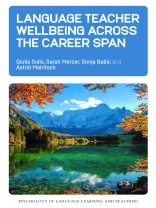This book explores language teacher wellbeing across the career span from an ecological perspective. It reports on empirical findings from an extensive investigation into language teacher wellbeing in various social, cultural and linguistic contexts. It is unique in casting light on the professional trajectory of language teachers and opening up discussions on the characteristics, psychological needs and strengths of language teachers at different points in their careers. It examines wellbeing in terms of the dynamic interplay between the challenges individuals encounter in their personal and professional lives, and the psychological, social and contextual resources that they draw on to buffer the impact of these challenges. The findings of the study will help readers to understand how language teachers can protect and nurture their wellbeing, not only to remain in the profession, but also to thrive in the long-term. The book will be a valuable resource for anyone interested in the lives, wellbeing and psychology of language teachers in diverse contexts and career phases.
Tabela de Conteúdo
Tables and Figures
Acknowledgements
Chapter 1. Introduction
Chapter 2. Language Teacher Wellbeing
Chapter 3. Pre-Service Language Teachers
Chapter 4. Early-Career Language Teachers
Chapter 5. Mid-Career Language Teachers
Chapter 6. Late-Career Language Teachers
Chapter 7. Teacher Wellbeing Across the Career Span
Chapter 8. Implications and Future Directions
Appendices
References
Index
Sobre o autor
Astrid Mairitsch is a research assistant at the University of Graz, Austria. Her research interests lie in the societal appreciation of teachers, teacher status, wellbeing of EFL teachers, and positive psychology in foreign language education.












